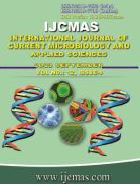


 National Academy of Agricultural Sciences (NAAS)
National Academy of Agricultural Sciences (NAAS)

|
PRINT ISSN : 2319-7692
Online ISSN : 2319-7706 Issues : 12 per year Publisher : Excellent Publishers Email : editorijcmas@gmail.com / submit@ijcmas.com Editor-in-chief: Dr.M.Prakash Index Copernicus ICV 2018: 95.39 NAAS RATING 2020: 5.38 |
Increasing world antimicrobial resistance requires to search for new microbes-derived biomolecules with higher antimicrobial activity from natural environments. This study aimed to evaluate the antimicrobial activity of fungal isolates associated with termite mounds. Isolates were obtained from soil and fungi comb samples of active Macrotermes bellicosus termite mounds. The antimicrobial bioassays of fungal isolates against test pathogenic bacteria and the fungus Aspergillus niger by dual culture, agar well diffusion, and disc diffusion methods were performed. The isolates with potent antimicrobial activity were phenotypically identified. Of over 65 fungal isolates, 48 exhibited an antagonistic effect against at least one test germ. Fifteen isolates (9 and 6 from soil and comb, respectively) that interestingly 3 (IM2s, IM15s, and IM51s belonging to Aspergillus sp.) had exclusively broad-spectrum antibacterial activity (10-35 mm) against all bacteria. Only the isolate IM51s inhibited Gram-positive and Gram-negative bacteria by dual culture and agar well diffusion. Six other isolates IM1s, IM61s (Rhizopus sp.), and IM3s, IM31m, IM34m, and IM40m (as Aspergillus sp.) had solely high antifungal activity (53-60% inhibition) against A. niger. This study indicated that the M. bellicosus mound material-associated fungal isolates can be of potential interest in discovering novel fungal species and antimicrobials, and their various applications.
 |
 |
 |
 |
 |